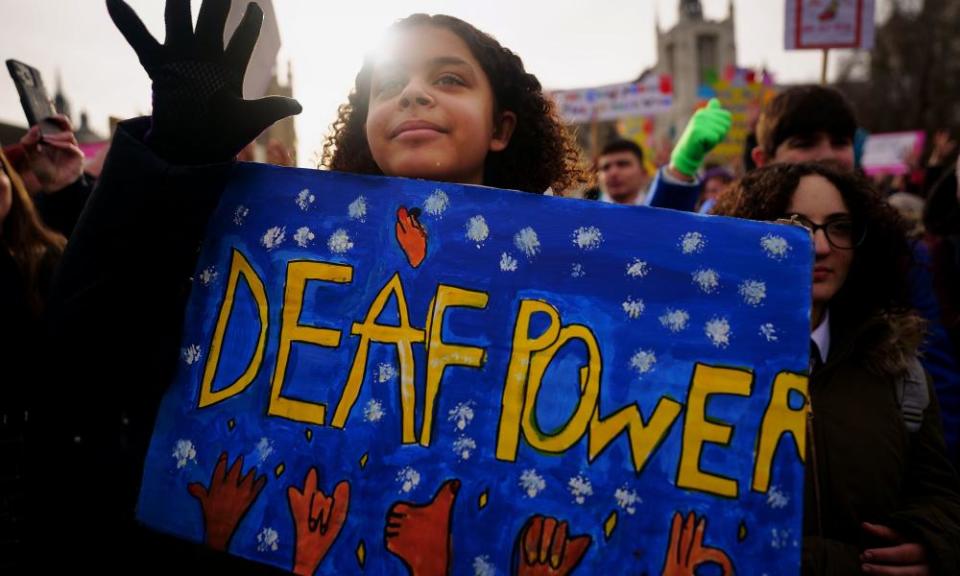The daily struggles that people with deafness face in our society

A big thank you to Liam O’Dell for confronting, indeed challenging, the need for deaf people to feel obliged to apologise for their disability (I’m done saying sorry for being deaf – I want to change how society treats people like me, 25 November). In my case, apology has given way to abject submission. I no longer go to restaurants and pubs, and try to avoid big social events. I have become tired of being among groups of people where I have no idea what is being said, yet giving the opposite impression by nodding my head in approval or, worse still, laughing in unison. In these situations, my usual trick in the past has been to zone in on an unfortunate individual sitting next to me and boring them senseless with conversation of my choosing.
The biggest impact is the loss of confidence. I dread the prospect of having to communicate meaningfully with someone wearing a face mask or sitting behind a glass screen. This scenario usually concludes with the unedifying image of me contorting myself to speak through the aperture at the base of the screen. Telephone conversations with strangers are nightmarish, with many of them ending prematurely. I could go on, but this article has sparked a spirit of resistance to my compliance.
Frank Cleary
Dublin, Ireland
• Liam O’Dell describes some of the daily struggles that deaf people experience. Most of the public believe the myth that hearing aids or implants replace normal hearing. Also, we have to battle the myth that lipreading replaces normal hearing.
Research with deaf users shows that technology distorts noises: adults may have an especially hard time relearning how to interpret sounds. It also depends on the level of spoken language that the deaf child has managed to acquire, despite having to learn to make sense of sounds that are only ever partial, thus may only hear vowel sounds or miss consonants. Further research found that “reading” lips as a supplementary to the sound gaps only gives approximately 30% of information since most sounds are within the mouth. Even those words that are visible can be confusing. It is like guessing ongoing crosswords without pen and paper every day. For example, in the phrase “the cat sat on the mat” only the sounds, th, o and m are visible on the lips. And b, m and p all look the same, as in bat, mat, pat.
Deaf EXperience is a deaf-led organisation that enables deaf children and young people to understand their deafness and supports their wellbeing, since most attend mainstream education without meeting deaf peers or having deaf cultural input. This means that most deaf children have not learned our value to society. It is highly stressful doing the “virtual crossword” all the time. Communication is two-way. There needs to be empathy and respect for our being deaf.
Jill Jones
Chair, Deaf EXperience
• I read Liam O’Dell’s article with interest, as I have had similar experiences. I started to use hearing aids in my late 20s after needing them for years. Liam references his limited British Sign Language (BSL) skills – but one of the shocking things is how hard it is for deaf people, their families and friends to access lessons. Courses are incredibly expensive, and while some (not enough) are funded for parents of deaf children, there is no funding for deaf adults to learn BSL.
The small amount I’ve learned has had a real impact on my life. I can follow a play at the theatre more easily, I can follow Zoom conferences better – but I can’t afford the lessons I would need to become fluent enough to use it.
BSL is one of the official languages of the British Isles and there needs to be funded support in place for everyone who wants to learn it – whether for themselves, friends, or work. It also has significant advantages. Many people struggle with ordering food and drink, or holding conversations, in loud environments – wouldn’t it often be easier if more of us just spoke BSL?
Jamie Hale
London
• I really identify with Liam O’Dell’s experience of being unsure of his hearing identity and have been through the process of shaking off my responsibility for being disabled. I was born moderately hard of hearing. However, I was six and at a state primary school by the time I received my NHS hearing aids. Beyond being made to sit at the front of the class, no other accommodation was made for my hearing loss. I was just left to muddle through socially and academically. I believe schools are much more supportive of children with hearing loss these days, but it’s hard to go from no support at all to confidently asserting yourself as a hard of hearing person.
Being a teenager with the impairment of an old person was socially very hard. On the occasions that I did throw myself into the social whirl, I found the easiest way to move on from disjointed conversations caused by mishearing words was to apologise, even if the outcome was actually quite funny. I always took the blame for not correctly hearing what someone said, as suggesting they could have spoken more clearly or looked at me while speaking seemed impolite.
When applying for jobs, I felt neither able-bodied or disabled due to the huge gulf medically and socially between being deaf and hard of hearing. My personal acceptance of my disability came about during a bad pandemic online interview. I failed to hear most of the questions. My imposter syndrome had prevented me from raising my hearing loss in advance. I was over 40 and finally I allowed myself to be seen as disabled. In doing so, I realised I didn’t need to apologise for being who I am.
Charlie Chamberlain
Norwich

 Yahoo Movies
Yahoo Movies 